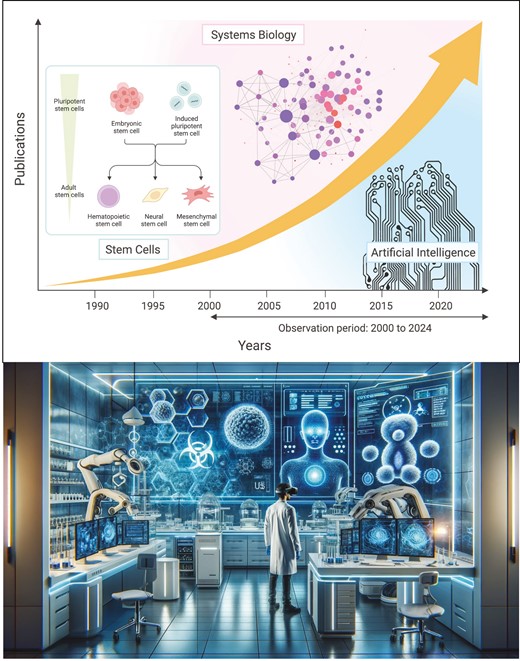The global evolution and impact of systems biology and artificial intelligence in stem cell research and therapeutics development: a scoping review.
Advanced bioinformatics analysis, such as systems biology (SysBio) and artificial intelligence (AI) approaches, including machine learning (ML) and deep learning (DL), is increasingly present in stem cell (SC) research. An approximate timeline on these developments and their global impact is still lacking. We conducted a scoping review on the contribution of SysBio and AI analysis to SC research and therapy development based on literature published in PubMed between 2000 and 2024. We identified an 8 to 10-fold increase in research output related to all 3 search terms between 2000 and 2021, with a 10-fold increase in AI-related production since 2010. Use of SysBio and AI still predominates in preclinical basic research with increasing use in clinically oriented translational medicine since 2010. SysBio- and AI-related research was found all over the globe, with SysBio output led by the (US, n = 1487), (UK, n = 1094), Germany (n = 355), The Netherlands (n = 339), Russia (n = 215), and France (n = 149), while for AI-related research the US (n = 853) and UK (n = 258) take a strong lead, followed by Switzerland (n = 69), The Netherlands (n = 37), and Germany (n = 19). The US and UK are most active in SCs publications related to AI/ML and AI/DL. The prominent use of SysBio in ESC research was recently overtaken by prominent use of AI in iPSC and MSC research. This study reveals the global evolution and growing intersection among AI, SysBio, and SC research over the past 2 decades, with substantial growth in all 3 fields and exponential increases in AI-related research in the past decade.
Authors
Silva-Sousa T, Usuda JN, Al-Arawe N, Frias F, Hinterseher I
External link
Publication Year
Publication Journal
Associeted Project
Systems Immunology of Human Diseases
Lista de serviços
-
Genomic analyses reveal broad impact of miR-137 on genes associated with malignant transformation and neuronal differentiation in glioblastoma cells.Genomic analyses reveal broad impact of miR-137 on genes associated with malignant transformation and neuronal differentiation in glioblastoma cells.
-
RNA-Binding Protein Musashi1 Is a Central Regulator of Adhesion Pathways in Glioblastoma.RNA-Binding Protein Musashi1 Is a Central Regulator of Adhesion Pathways in Glioblastoma.
-
MicroRNA Transcriptome Profiling in Heart of Trypanosoma cruzi-Infected Mice: Parasitological and Cardiological Outcomes.MicroRNA Transcriptome Profiling in Heart of Trypanosoma cruzi-Infected Mice: Parasitological and Cardiological Outcomes.
-
Genome mapping and expression analyses of human intronic noncoding RNAs reveal tissue-specific patterns and enrichment in genes related to regulation of transcription.Genome mapping and expression analyses of human intronic noncoding RNAs reveal tissue-specific patterns and enrichment in genes related to regulation of transcription.
-
Antimicrobial peptide LL-37 participates in the transcriptional regulation of melanoma cells.Antimicrobial peptide LL-37 participates in the transcriptional regulation of melanoma cells.
-
Down-regulation of 14q32-encoded miRNAs and tumor suppressor role for miR-654-3p in papillary thyroid cancer.Down-regulation of 14q32-encoded miRNAs and tumor suppressor role for miR-654-3p in papillary thyroid cancer.
-
Integration of miRNA and gene expression profiles suggest a role for miRNAs in the pathobiological processes of acute Trypanosoma cruzi infection.Integration of miRNA and gene expression profiles suggest a role for miRNAs in the pathobiological processes of acute Trypanosoma cruzi infection.
-
Integrative Biology Approaches Applied to Human DiseasesIntegrative Biology Approaches Applied to Human Diseases
-
Proteomics reveals disturbances in the immune response and energy metabolism of monocytes from patients with septic shock.Proteomics reveals disturbances in the immune response and energy metabolism of monocytes from patients with septic shock.
-
Genomics, epigenomics and pharmacogenomics of Familial Hypercholesterolemia (FHBGEP): A study protocol.Genomics, epigenomics and pharmacogenomics of Familial Hypercholesterolemia (FHBGEP): A study protocol.
-
Melatonin-Index as a biomarker for predicting the distribution of presymptomatic and asymptomatic SARS-CoV-2 carriersMelatonin-Index as a biomarker for predicting the distribution of presymptomatic and asymptomatic SARS-CoV-2 carriers
-
Profiling plasma-extracellular vesicle proteins and microRNAs in diabetes onset in middle-aged male participants in the ELSA-Brasil study.Profiling plasma-extracellular vesicle proteins and microRNAs in diabetes onset in middle-aged male participants in the ELSA-Brasil study.
-
Big Data and machine learning in cancer theranosticsBig Data and machine learning in cancer theranostics
-
Genomic positional conservation identifies topological anchor point RNAs linked to developmental loci.Genomic positional conservation identifies topological anchor point RNAs linked to developmental loci.
-
Integrative systems immunology uncovers molecular networks of the cell cycle that stratify COVID-19 severityIntegrative systems immunology uncovers molecular networks of the cell cycle that stratify COVID-19 severity

